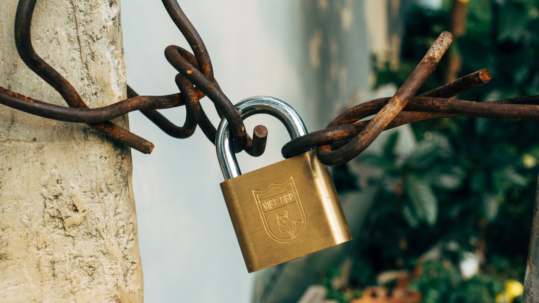
05 Jan Panic Attacks – How Can I Help?
There seem to be two ways to identify with the phrase “panic attack”. One is to nod and say, “I’ve been there!”, and the other is to wonder what a panic attack is, being perplexed as to how a seemingly normal human can simply, well, panic.
But even if you have no personal experience, I want to encourage you that, yes, it is possible to equip yourself with helpful information to support your friend or family member who is struggling. I have had the privilege of watching a beautiful soul wrestle with the concepts and reality of panic attacks, and learn to put into practice the practical needs of those with mental health challenges despite having never experienced it for herself. Through online education, intentional questions with strugglers, and conversations with experts, she grew from someone who didn’t really “get it,” to someone I now consider one of my biggest allies in my most out-of-control moments. Watching her determination to learn has inspired me to be more curious and teachable when it comes to relating to others who are suffering in a way I have not experienced. She has shown me what it looks like to ask good questions, listen patiently, and validate the hardship with compassion.
On that note, this article is for the people who don’t understand, but want to know more. It is for the curious. It is for the one who wants to help but doesn’t know how.
And before I talk about my personal experience, I want to acknowledge that people are unique. *Gasp*. I know, it’s a shocker. But the reality is, every person has a unique experience in the past, and a unique way of dealing with it in the present. Be it from childhood trauma, acute distress, or an unidentifiable cause, anxiety and panic look a lot of different ways. When I asked my counselor what he considers a panic attack, he said it’s when the level of anxiety is so overwhelming that it becomes externally/physically manifested. Trembling, sweating, racing heart, difficulty breathing, crying, and so many more symptoms accompany the chaos. He also talked about how it’s not an “on/off” switch, but rather a dial. For one person a panic attack looks like a racing heart and frantic thoughts in the middle of the night. For another it’s completely losing touch with reality, shaking and crying, unable to be consoled in the middle of the workday. Every person, and every situation, is different.
I would also like to acknowledge that a person can be a faithful and legitimate Christian while simultaneously struggling with panic attacks.
Are panic attacks from God? Nope.
Are they good, pure, holy, and pleasing? Nope.
Does the truth in Scripture have the power to set each person free and heal their mind? Yes.
And I wish this portion of the article was me telling you how I overcame. How I employed great strategies to “renew my mind” (Romans 12:2) and how I “cast all my cares on Him” (1 Peter 5:7). Instead, I’m in the thick of it, holding onto hope despite the tension. I believe that the Lord invites us to come to Him, that he is our refuge and strength. I recently saw a quote along the lines of, “Not once did God ask you to ‘worry about it’”. Rather, time and time again he encourages us to NOT be afraid or anxious. But this is where I’m at. You get to join me in the midst of the transformation and sanctification process as I continue to learn how to put off the old self and put on the new. While I am ‘doing my best’ to walk the Christian walk in a broken world, I need the continual reminder that it is not by my strength that I can overcome. Just like the Lord told Paul, “My grace is sufficient for you, for my power is made perfect in weakness,” in 2 Corinthians 12:9, I hope that each day, I will press more into the sufficiency of Christ and less into my own ability. Because of the life, death, and resurrection of Christ, my sinfulness and my opposition to God has been taken away. The death penalty that I was owed was paid, and in exchange, Christ has given me life. Abundant life. Sometimes it’s hard to keep God in view during the dark seasons, but living each day intentionally seeking God and developing an active relationship with Him is the first building block for abundant and eternal life. And as we live our lives, walking by the Spirit of God, the fruit is love, joy, peace, patience, kindness, goodness faithfulness, gentleness, and self-control (Galatians 5:22-23). As we continue to mature in Christ, these are the good fruit that grows.
Life is hard. But God is good.
And God works all things together for the good of those who love him and are called according to his purposes (Romans 8:28). I pray that by sharing my experiences with panic and anxiety that the suffering can be used for good. That I can offer tangible tips to help others, that I can offer encouragement for those who are struggling, and that I can be an example of perseverance in the midst of suffering.
I pray that as we go through the difficult seasons of life and face the broken world that we would let the darkness drive us into the light. That we would use our suffering as a catalyst for our faith, and all the more fervently pursue the presence and peace of God.
With that in mind, I would like to share more about what it is like to experience panic, and how you can offer comfort in the midst of the chaos.
Identifying Anxiety and Panic
The first time someone told me I had anxiety I thought they were kidding. They weren’t. The concept was so foreign to me that despite being completely on edge 24/7 and feeling intense stress about literally everything, I was oblivious. I brushed it off. In my mind, having anxiety meant worrying. It was for the peer-pressured high schooler or the mom of a sick child. If worry = anxiety, I was pretty sure I didn’t have anxiety. “Ok….but what do I DO with it?” I asked, realizing they were right. “Do I stuff it down? How do I get it out?” There was a long pause. Unfortunately, those are not easy questions to answer.
Similarly, when my counselor diagnosed me with Panic Disorder I was completely caught off guard, despite the fact that I was dealing with panic attacks several times a week (with varying degrees of intensity) and also had one each week in his office for the first month I saw him. When I pictured what Panic Disorder would look like, it wasn’t what I was experiencing. In fact, even the name made me uncomfortable. I don’t just go around panicking like a chicken with its head cut off. Yet I was frequently overwhelmed by anxiety and depression beyond the point of my ability to internally manage.
Funny enough, I think that of all the mental health things I struggle with, panic attacks are my least favorite to talk about. It’s uncomfortable. It’s relatively unrelatable. It’s highly subjective. It’s weird. But as a previously healthy individual whose perspective was less-than-knowledgeable, I feel a compelling to share. If I can make it through one, you can learn how to help me come out of one. I believe in us.
My Experience
At the cost of using highly unspecific words, when I have a panic attack it mainly just feels “bad.” So descriptive. I know. Allow me to explain.
Physically it feels like heartburn and a heart attack at the same time. Heat in my chest, pounding in my ears. Do I need to puke? Everything is trembling. Depending on the day, my muscles might be buzzing with energy or clenching protectively. Nothing seems to hold the attention of my eyes. My fingers grasp for objects of any kind to hold.
Emotionally, it feels out of control. Too much. All at once. All the stations are jammed. No margin. No rationality. Absolute chaos. I am not ok.
Mentally it feels infuriating. It feels so dumb. The logical brain comes, takes a look, and shakes its head at the madness. The internal monologue gets snippy or critical. “What the heck? You’re fine. Why can’t you keep it together? This is ridiculous.”
And as much as I feel like a 5-year-old when asked to name the colors in the room or count how many pictures are hanging on the wall, it is what brings me back. And heck, even laughing at the awful situation can sometimes help break the seal. Let me explain.
“Grounding” is a term used to reference actions or exercises that help bring the person from a state of emotional chaos to a point of relative stability. With such overwhelming emotion and anxiety, the person is not likely to respond well to reasoning. They KNOW it’s unreasonable. They KNOW the world isn’t ending. But for them, it is. Again, panic attacks are subjective. If a person is shutting down or becoming agitated, there is seldom room for reason (or saying a prayer, or reading a bible verse, or talking about what’s wrong).
And that’s where grounding comes in.
- Count the number of ridges on the cup that you are holding. 15? Count them again.
- Find a button or seam on your clothing. Is it smooth? Does it have holes? How is the cloth stitched together? Are the stitches wider or narrow?
- Hold your watch to your ear so you can hear the ticking. Count to 15. Then again.
- Listen for ambient noise. Is it buzzing? Is it whooshing? Is it high-pitched?
- Look for inconsistencies in the molding on the ceiling. What material is it? How were the corners put together?
- Move your fingers. Do they feel flexible or stiff? How does the skin feel when you bend them?
- Are you wearing a necklace? Where is the clasp? Is the chain smooth or rough? Does the pendant fit in your fingers?
It is not about intelligence. It is not about faith. It is not about reasonable reactions. It is about an emotional crisis that needs to be dealt with. The answer to the question, “Are you OK?” will certainly be answered with a definitive, “No.”
Ways you can help someone in crisis:
- Take a moment to read their body language. When you come close, do they back up defensively? Even a best friend can feel threatening in the wrong moment. Give them space if they need it. If they welcome your presence, be gentle and alert.
- Help them get grounded. Ask them what they can hear. Ask them what they smell. Ask them to count something in the vicinity, be it ceiling tiles, coins in your pocket, or pens in your desk.
- Ask them about specific good memories. Where is their favorite place to hang out? What is their favorite hobby? Ask about the little details. What kind of bait do they use for fishing? What size needles do they use to knit their dishcloths?
- Go for a walk. If they want to talk, talk. If not, embrace the awkward silence. But get them moving. One step, and then another, and then another.
- Throw something back and forth. Is there a tennis ball nearby? What about a pinecone? Or an eraser?
- Speak your favorite bible verse, one line at a time. Read a recipe. Pop open a book and start reading a random chapter.
- Play a song on your phone that you know they like.
-
Once they regain their stability, ask what you can help with. Do they need a ride somewhere? Do they need you to refill their water bottle? Do they need a hug? If the answer is, “No thanks, I’m good,” be gracious and willing to walk away. Sometimes they just want space. Also keep in mind they will likely apologize several times whether they mean to or not. Feel free to offer phrases like, “You’re doing a great job given the circumstances,” or “I’m glad I was here with you, no need to apologize.”
This journey has been full of my own trial and error, but I have also been blessed to have people surrounding me who are not new to the anxiety scene. There are two instances that helped shape my perspective.
Being Helped
The first was during the early stages of my symptom onset, and I had no idea what was happening. I felt sick and shaky and knew I needed help. I asked to talk to my friend, but by the time we sat down to chat I was starting to cry and grasp at tangible objects. She held my hand, and line by line recited Psalm 23. I could barely keep a line of concentration and certainly couldn’t verbalize what I needed in that moment, but she was calm, and steady, and the Lord used her in that moment to know exactly what she needed to do. Each word and sentence and verse came after the next, and my mind clung to the rhythm as if my life depended on it. From that point forward, any time I felt building anxiety I would find a notebook and do my best to write down the Psalm from memory. The experience helped me see that having people to point me to Christ in the midst of the inner chaos was huge. She didn’t assert that the verses were true, therefore, I shouldn’t have anxiety, but rather reminded me of the truth that God IS my shepherd, and leads me to still waters so that I could find refuge in him despite the present anxiety. I also learned that I thrived on continuous streams of words to stay grounded.
The second example was during a hard season at camp, and I started having intense flashbacks in the pantry while gathering ingredients for a recipe. The result was a panic attack, to which another staff member came to help because I was quite unwell. “Hold my hand,” she offered, to which I muscled, “I think I would break your hand.” With a sad laugh, I gripped an onion basket instead. The intensity of the anxiety quickly started escalating, and I was tensing up, and losing focus/presence of mind. “How many knives are in that knife block?” she demanded. I squinted hard, to see through the fury of emotion. “Seven,” I said through my teeth, pausing to work up the ability to continue, “and a honing rod.” She pushed a little harder, asking what a honing rod was for. “Taking the knicks out of the blade.” I responded. Every millisecond I wasn’t engaging, I was losing the battle, and she knew that. She pressed for more information on keeping knives sharp and how a honing rod was to be used. It felt weird. Frantically ejecting facts about the varying ways to keep a knife in top condition wasn’t what I expected it to look like for someone to help me through a panic attack. Yet there we were. From this experience, I realized that having other people to challenge the crisis is awesome. She was not implying that my experience was fabricated or exaggerated– but rather she was determined to help the irrational see the rational. By gently “demanding” simple facts, it got me in the right headspace to manage the intrusive memories with the same logic. Just like there are seven knives and a honing rod in that knife block, the reality is that I am in the kitchen pantry under safe circumstances and the past is not the present.
Final Thoughts
The thing I’m learning about mental health issues is that it truly is more approachable than one might think. Asking questions, doing some research, and being available are ways that a mentally healthy friend can support someone who is struggling. These challenges are not as unrelatable as they might seem.
They are simply an exaggeration of the human experience.
You know what it’s like to feel really scared. Use that to empathize with the person who is losing control because they are scared despite normal/safe circumstances.
You know what it feels like to lose hope after a disappointing turn of events. Use that to empathize with the person who has felt hopeless all winter with seasonal depression.
You know what it feels like to be nervous on your first day of school or at a gathering where you don’t know anyone. Use that to empathize with the person who battles social anxiety even around friends who know them well.
You know what it feels like to have mood swings or just not “feel like yourself”. Use that to empathize with those who have mood disorders and are working with a doctor to keep themselves stable.
You know what it’s like to struggle with self-control, and regret how you keep doing “the thing”. Use that to empathize with the person who has compulsions that invade every part of their lives and cause them much frustration.
You don’t know what it’s like to live that way every day. But you HAVE lived with similar things, and it sucked. So as a friend, invite yourself over to cook and clean up dinner, pick the movie (with their triggers in mind), schedule outings for when they’re feeling good, or quietly hand them a fidget toy when you notice they’re on edge. Ask them how you can better support them. Listen to their experiences without flinching. Encourage them and build them up.
Mental health issues are hard. They suck. But the same person who was present on the worst day will be the friend who is called first when a breakthrough happens.
This was a sucky article to write, and I’m sure it wasn’t very fun to read. But on behalf of the struggling people in your life, I want to say, “thank you” for pressing in, and for choosing to listen. I pray that God would continue to equip you to bring comfort to those who need it, that you would be strengthened in the face of difficult circumstances, and that the hope that you carry would be freely received by others.
-
Life and Worship in the Midst of Apathy
I am driven by striving. In one conversation with a Christian mentor, the words blurted out before I could properly weigh them: “Striving is what makes life worth living.” I wasn’t completely wrong, but I definitely wasn’t right either. A more appropriate statement might have been “Striving towards a goal is life-giving to me,” and yet with tears in my eyes as I grieved the loss of my ability...
06 August, 2023 No comment -
Invisible Exercise – Poems of a Friend
This poem is written by none other than my sister and friend, Sierra Wied. Having lived our lives in beautiful connectedness, I am thrilled to be able to share her musings, and am proud of how she is pressing into God’s desire for healing and hope. Enjoy!...
24 May, 2023 No comment -
My “Quick” Tips For Living With Mental Health Challenges
Mental health isn’t something that is solved with 7 quick tips from a young person on the internet. I get that. The complexity of a person’s story and the depths of the needed healing are not concepts that are lost on me, and the more I live my life, the more I realize how little I know about the human heart and mind....
09 May, 2023 No comment






Pingback:Fitbit or Analog - Managing Heart Rate and Staying Grounded - Kaley Faith
Posted at 15:48h, 10 January[…] it as a tool during escalating stress and panic attacks (Read more about managing panic attacks here). Three cheers for the under-the-radar greatness of […]
Pingback:Green Flags in Counseling - Kaley Faith
Posted at 18:40h, 30 March[…] He has helped me through many panic attacks in his office, and he also equips me to handle them on my own. They are the real-life actions that I can take to minimize each episode, and it’s exactly what I was in desperate need of. (Read more about navigating panic attacks here.) […]